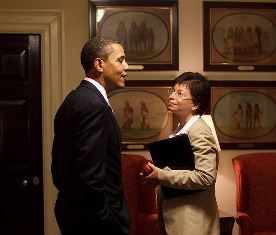 President Obama with Valerie Jarrett |
It has been two years since President Obama signed the Affordable Care Act, and already, the new law is improving the lives of African-Americans.
Since March 2009, more than 2.4 million African-American seniors with Medicare have received free preventive services such as diabetes screenings. About 410,000 more African- American young adults who would otherwise be uninsured gained coverage due to the law. In addition, 5.5 million African-Americans with private health insurance now have coverage for preventive services without paying an extra penny at their doctor's office.
And 10.4 million African-Americans with private insurance coverage no longer face lifetime limits thanks to the new health care law -- in other words, your insurance company can no longer drop your coverage at a time when you need it most.
Behind each of these are statistics are stories of mothers and fathers, daughters and sons, friends and neighbors, who are healthier because of the new law. I know firsthand that the Affordable Care Act is already making a difference in people's lives. When my daughter, Laura, was between school and a new job, she was able to go on my insurance plan thanks to the new health care law.
The new health care law will also make health care more accessible in the African-American communities most in need. Nearly 26 percent of patients served by community health centers in 2010 were African-American, and the Affordable Care Act increases the funding available to those centers in all 50 states. They currently serve more than 19 million patients, and by 2015, because of the health care law, they will be able to serve millions more.
The Affordable Care Act has also helped triple the number of clinicians in the National Health Service Corps since President Obama took office. The Corps is a network of primary care providers serving areas of significant need, and helps medical students pay back their loans in exchange for their service.
Finally, the new health care law is helping to level the playing field and eliminate health disparities -- a key priority for the Obama Administration. Today, African-Americans are less likely to have health insurance than Americans as a whole. They are also less likely to have access to a primary care physician, and less likely to receive high quality care.
Compared to non-Hispanic whites, the average African-American child is twice as likely to be hospitalized from asthma, and more than four times as likely to die from it.
The Affordable Care Act takes steps to change all this. The Department of Health and Human Services has developed and is implementing the first-ever department-wide Action Plan to Reduce Health Disparities. The new health care law is providing new tools and resources to put the plan into action, including upgrading data collection standards to better understand and ultimately get rid of gaps in the quality of health and health care across groups.
Over the next few years, the health care law will introduce new tools that will make a huge difference in the lives of millions of African-Americans, expanding access to health coverage to 34 million Americans, including nearly seven million African-Americans. Starting in 2014, Affordable Insurance Exchanges will serve as a one-stop marketplace for Americans, new tax credits will help families buy coverage, and Medicaid will be expanded to cover more low-income Americans.
Of course, we still have a great deal of work to do to make sure every American has access to affordable, quality care -- and eliminating health disparities entirely is a goal that will take a great deal of time to achieve. But each and every day, we are making progress, and we will continue to do so, until all Americans have the care and security they deserve.
For more on the Affordable Care Act and the African-American community, click here.






















































































































































































































































































































